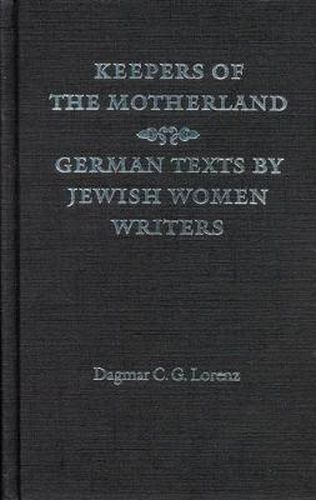Readings Newsletter
Become a Readings Member to make your shopping experience even easier.
Sign in or sign up for free!
You’re not far away from qualifying for FREE standard shipping within Australia
You’ve qualified for FREE standard shipping within Australia
The cart is loading…






Keepers of the Motherland is the first comprehensive study of German and Austrian Jewish women authors. Dagmar Lorenz begins with an examination of the Yiddish author Glikl Hamil, whose works date from the late-seventeenth and early eighteenth centuries, and proceeds through such contemporary writers as Grete Weil, Katja Behrens, and Ruth Kluger. Along the way she examines an extraordinary range of distinguished authors, including Else Lasker-Schuler, Rosa Luxemburg, Nelly Sachs, and Gertrud Kolmar. Although Lorenz highlights the author’s individualities, she unifies Keepers of the Motherland with sustained attention to the ways in which they all reflect upon their identities as Jews and women. In this spirit Lorenz argues that the themes and characters as well as the environments evoked in the texts of Jewish women authors writing in German resist patriarchal structures. The term ‘motherland,’ defining the domain of the Jewish woman’s native language, regardless of political or ethnic boundaries, is juxtaposed with the concept ‘fatherland,’ referring to the power structures of the nation or state in which she resides. Lorenz describes a vital, diverse, and largely dissident literary tradition-a brilliant countertradition, in effect, that has endured in spite of oppression and genocide. Combining careful research with inspired synthesis, Lorenz provides an indispensable work for students of German, Jewish, and women’s writings.
$9.00 standard shipping within Australia
FREE standard shipping within Australia for orders over $100.00
Express & International shipping calculated at checkout
Keepers of the Motherland is the first comprehensive study of German and Austrian Jewish women authors. Dagmar Lorenz begins with an examination of the Yiddish author Glikl Hamil, whose works date from the late-seventeenth and early eighteenth centuries, and proceeds through such contemporary writers as Grete Weil, Katja Behrens, and Ruth Kluger. Along the way she examines an extraordinary range of distinguished authors, including Else Lasker-Schuler, Rosa Luxemburg, Nelly Sachs, and Gertrud Kolmar. Although Lorenz highlights the author’s individualities, she unifies Keepers of the Motherland with sustained attention to the ways in which they all reflect upon their identities as Jews and women. In this spirit Lorenz argues that the themes and characters as well as the environments evoked in the texts of Jewish women authors writing in German resist patriarchal structures. The term ‘motherland,’ defining the domain of the Jewish woman’s native language, regardless of political or ethnic boundaries, is juxtaposed with the concept ‘fatherland,’ referring to the power structures of the nation or state in which she resides. Lorenz describes a vital, diverse, and largely dissident literary tradition-a brilliant countertradition, in effect, that has endured in spite of oppression and genocide. Combining careful research with inspired synthesis, Lorenz provides an indispensable work for students of German, Jewish, and women’s writings.